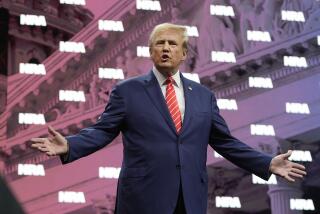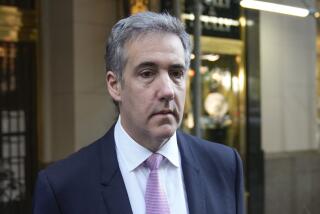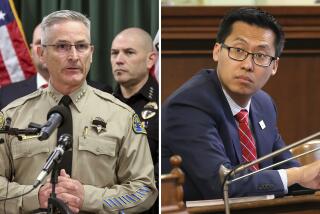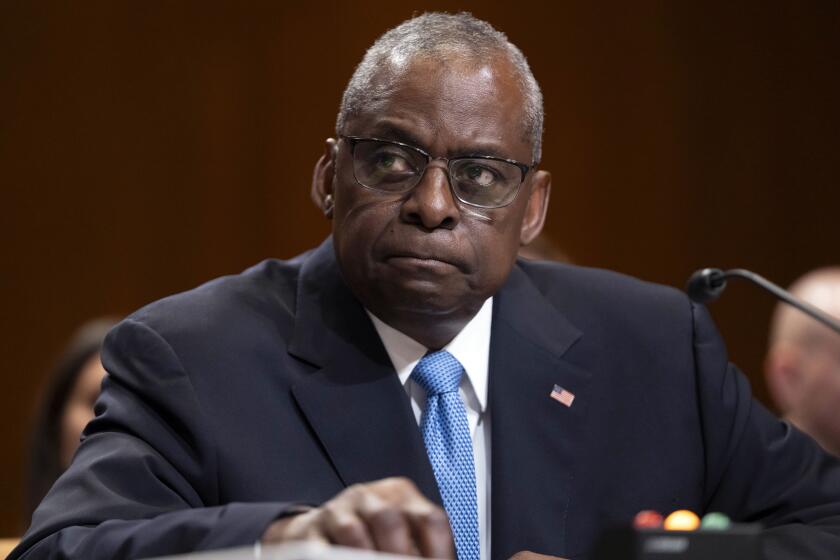Senate Takes on Thorny Campaign Reform Issue
Thwarted for years, leaders of a crusade to close election law loopholes reach a milestone today as the Senate launches two weeks of debate that could yield the most comprehensive overhaul in campaign financing since the Watergate era.
The reformers’ top goal is to abolish the unlimited donations to political parties, known as soft money, that have undermined laws restricting contributions to federal candidates.
But increasingly the reform debate is turning on other issues raised by lawmakers with gripes about modern campaigns.
Some say donation limits for candidates are too low. Others say television ads cost too much. Still others complain that self-financed, millionaire candidates are flattening opponents who can’t raise enough money to respond.
One of the hottest disputes concerns the rapid growth of political advertising by groups other than candidates or parties during the crucial weeks before federal elections. The matter is so sensitive to politicians who fear stealth attacks that the sponsors of the soft-money ban, Sens. John McCain (R-Ariz.) and Russell D. Feingold (D-Wis.), agreed to a provision to rein in what they call sham “issue” advertising.
But critics on the left and right, from the AFL-CIO to the Christian Coalition, fervently defend such advertising as constitutionally protected free speech.
The resolution of this controversy and many others will test the fragile coalition that McCain and Feingold have assembled to bring the reform debate to the floor, and will play a key role in whether President Bush can be convinced to sign a final bill.
McCain, asked to assess the bill’s chances, said Sunday that he believes a majority of senators support his bill as it stands now. But he acknowledged that the real battle is over how the bill may transform during debate.
“The amending process will probably determine the final outcome,” McCain said. “In other words, we will have some very interesting amendments, and we will have very interesting votes on some of those amendments.”
Appearing Sunday on NBC’s “Meet the Press,” McCain and his leading foe, Sen. Mitch McConnell (R-Ky.), previewed what promises to be a debate such as the Senate rarely sees: unpredictable, wide open and difficult to read on party lines. The debate is all the more remarkable because it is occurring before the Senate takes any action on tax cuts or education reform--two of Bush’s top priorities.
McCain said the outcome is uncertain because “one, we’re asking incumbents to vote to change a system that keeps incumbents in office . . . [and] the second thing is, every special interest that uses money to gain access and influence in Washington is opposed to this bill.”
McConnell insisted that McCain’s bill would help incumbents more than the status quo. Soft money, McConnell said, is a key source of national party finances. And national parties often provide seed money for insurgent candidates.
“Fundamentally, what he does is not take money out of politics, he takes the parties out of politics,” McConnell said.
For years, McConnell and the Senate GOP leadership have kept the McCain-Feingold measure off the Senate floor by threatening a filibuster. Advocates, seeking to force consideration of the bill, as recently as October 1999 rounded up majority support but less than the super-majority of 60 votes needed to end a filibuster.
At least three factors propelled the bill this year past the filibuster threat. One is McCain’s high national profile after his presidential campaign drew surprising support for campaign finance reform. Even though he lost the GOP nomination to Bush, McCain, with his “straight talk” motto, claimed he had been given a mandate for change.
Another reason is Senate turnover. Several incumbents who had opposed McCain-Feingold were toppled in November by pro-reform challengers who lifted the Democrats to a 50-50 split with Republicans. Democrats have voiced almost unanimous support for the bill, though some appear now to be wavering as chances for enactment have improved. Most Republicans until now have opposed it.
A third factor is the new White House. During Bill Clinton’s presidency, Senate Republican leaders knew they were, in all likelihood, the only force stopping a soft-money ban from becoming law. Large bipartisan majorities in the House twice in recent years approved a ban. Clinton fruitlessly urged Senate follow-up. Now that Bush is in office, Republicans can count on a potential veto to defend their interests. Bush, though, has avoided explicit threats, and it remains unknown what he would do if McCain-Feingold lands on his desk.
As candidate and as president, Bush has supported a ban on soft-money donations by corporations and unions--but not wealthy individuals. The White House also is encouraging a bill by Sen. Charles Hagel (R-Neb.) to cap soft-money donations to national parties at $60,000 per donor a year. The limit would not apply to state parties.
In the 2000 election cycle, Republicans and Democrats raised more than $487 million in soft money, about evenly split between them. That was nearly double the $263 million raised in the 1996 cycle and more than quadruple the 1992 total of $86 million. Soft money refers to donations made to parties, often in sums of $100,000 or more, that theoretically may be spent only on party-building activities such as voter registration and turnout drives. It is not supposed to be spent on ads to elect or defeat specific candidates.
So-called hard money is subject to federal contribution limits set in 1974. The limits are $1,000 per individual ($5,000 for political action committees) per election. Hard money may be spent on ads explicitly seeking the election or defeat of a candidate. In recent years, though, parties have increasingly spent soft money on what looks to the average observer like ordinary campaign advertising.
But now the debate is moving in other directions. Bush last week made public his own reform principles. One, regarded by Democrats as a deal-breaker, would force unions to obtain consent from members before allowing them to spend their dues on politics.
Another volatile question is “issue” advertising by outsiders who analysts say spent hundreds of millions of dollars to influence the 2000 elections. Sens. Olympia J. Snowe (R-Me.) and James M. Jeffords (R-Vt.) wrote a provision into the bill to ban ads funded directly by corporations and unions in the weeks before the election if they refer to federal candidates. Other groups would face new disclosure requirements.
Also, several Republicans argue that hard-money limits are out of date. Sen. Fred Thompson (R-Tenn.) would triple them to account for inflation. Many Democrats, deeply suspicious, say raising limits would do nothing to reduce the flood of money in politics. This issue alone could splinter the pro-reform coalition.
Whether the McCain-Feingold bill, or something like it, can survive the amendment onslaught is unknown. Thomas Mann, a campaign finance expert at the nonpartisan Brookings Institution, said the Senate could seek to kill the bill by amendments. Or it might, through a series of crucial test votes, draw key players into genuine negotiations.
More to Read
Get the L.A. Times Politics newsletter
Deeply reported insights into legislation, politics and policy from Sacramento, Washington and beyond. In your inbox three times per week.
You may occasionally receive promotional content from the Los Angeles Times.






